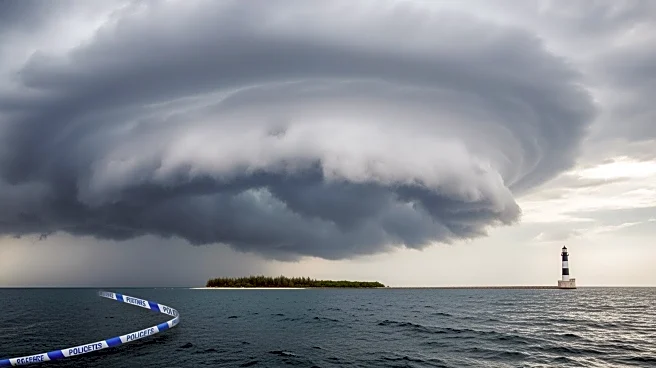What's Happening?
Hurricane Melissa has intensified into a Category 5 storm, posing a severe threat to Jamaica and Haiti with potential catastrophic flooding and landslides. The hurricane, with maximum sustained winds of
160 mph, is expected to make landfall in Jamaica and then move towards southeastern Cuba and the Bahamas. The U.S. National Hurricane Center has warned of up to 40 inches of rain in some areas of eastern Jamaica and 16 inches in western Haiti. The storm has already resulted in fatalities in Haiti and the Dominican Republic, and has caused significant damage to homes and infrastructure. Authorities in Jamaica have activated emergency shelters and are urging residents to take the storm seriously.
Why It's Important?
The impact of Hurricane Melissa is significant due to the potential for widespread destruction and humanitarian crises in the affected regions. Jamaica and Haiti, both vulnerable to natural disasters, face the risk of severe flooding, landslides, and storm surges, which could lead to loss of life and extensive property damage. The storm's impact on agriculture is particularly concerning in Haiti, where millions are already experiencing crisis levels of hunger. The economic and social repercussions could be profound, affecting food security, infrastructure, and the overall stability of the region.
What's Next?
As Hurricane Melissa continues its path, emergency response efforts are underway in Jamaica and Haiti. Authorities are focused on evacuations, shelter provisions, and preparing for potential rescue operations. The storm is expected to make another landfall in eastern Cuba, where similar preparations are being made. The international community may need to provide aid and support to assist with recovery and rebuilding efforts in the aftermath of the storm.
Beyond the Headlines
The intensification of Hurricane Melissa highlights the increasing frequency and severity of extreme weather events, possibly linked to climate change. This raises questions about the preparedness and resilience of Caribbean nations in facing such challenges. Long-term strategies for disaster risk reduction and climate adaptation are crucial to mitigate future impacts and protect vulnerable populations.










